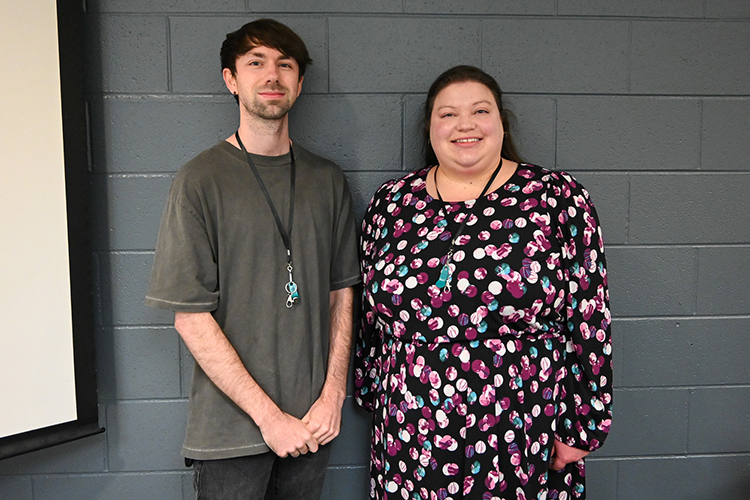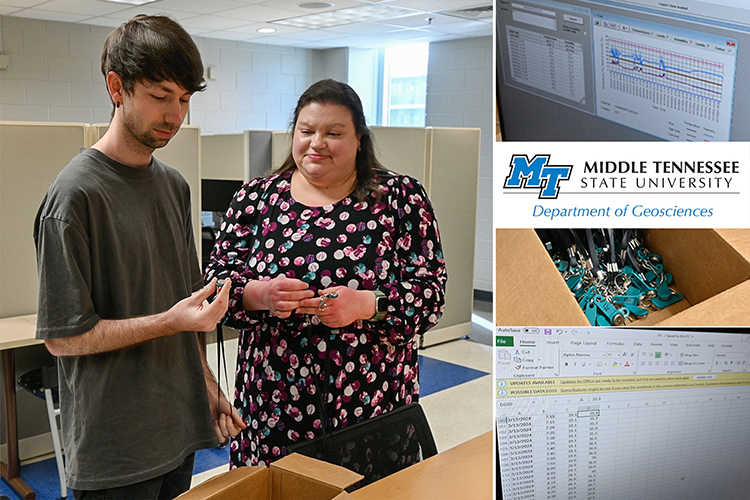MURFREESBORO, Tenn. — Middle Tennessee State University geosciences faculty recently landed a National Science Foundation grant to make the critical, yet sometimes overwhelming issue of climate change more concrete and relatable to their undergraduate students.

Alisa Hass, assistant professor, collaborated with Mark Abolins, professor, to win the $260,000 NSF grant and develop the research project involving around 300 students wearing iButton temperature and humidity sensors, known academically as “hygrochrons,” and analyzing the resulting data of their individual climates.
“Climate change is something that affects all of us, and this student population represents the people who are going to be dealing with it and hopefully helping to solve it,” said Hass, who has an extensive background in researching the effects of heat on different groups. “It can feel like such an intangible, big topic, so we came up with the temperature sensor project to help them see how they’re being directly affected by their personal climates.”
Abolins, whose background is in caves, first learned about the grant and brought it to Hass, sparked by his additional interest in undergraduate education innovation.
“It seemed like a great fit and opportunity to get her (Hass) and her climate research work more support,” Abolins said. “She’s done a lot of this heat impact work with a smaller sample size (on average about 30 participants), and this was an opportunity to not only get a large number of MTSU students involved for their own educational benefit, but it also intersected with furthering the understanding of climate, heat and humidity and how people experience them….
“We ended up getting funded on our first attempt, not often the case.”
Additionally, Hass and Abolins tapped colleagues Brittany Price, assistant professor, and Jeremy Aber, professor, to conduct the project with their general education science students as well, plus the grant offered the opportunity to bring on a graduate research assistant. Hass added Sean Sanders, a geoscience master’s student, to their team.
“This project is helping me gain relevant work experience because my main job doesn’t involve research,” Sanders said. “Now I can say I’ve used industry-specific programs, and I’m part of a project that can help these students see what types of climates they are exposed to and how it can affect their physical health.”

Hass said the Office of Research and Sponsored Programs helped the team with grant submissions and negotiations, and that the team’s project rollout this spring and initial responses from students capturing and observing their “microclimate” data have been going well so far.
Wrapping up her junior year as a major in psychology, Rachel Hortert of Murfreesboro said the project has made her and her classmates in Hass’ Physical Geography course more climate aware.

“I have been more conscientious about the microclimates I come across,” Hortert said. “It’s not just something we’re learning about from a PowerPoint; the activity showed it is our everyday lives…. The discussions that arose from this revealed a lot of surprises for us. There was a wide variety of temperatures, comparisons, observations and awareness that were made about our surrounding microclimates — those that we were exposed to and otherwise.”
Hass and her team will repeat the activity with their students next fall and spring semesters and plan to launch the project in local community colleges next year as well.
“Mark will start recruiting with community colleges this fall,” she said. “We’re excited to continue this work and help our students and students in the larger community understand how they are impacted by climate without it being overwhelming or untouchable.”
Learn more about opportunities at the Department of Geosciences at https://mtsu.edu/geosciences/. Learn more about the opportunities and support at the Office of Sponsored and Research Programs at https://mtsu.edu/research/.
— Stephanie Wagner (Stephanie.Wagner@mtsu.edu)


COMMENTS ARE OFF THIS POST